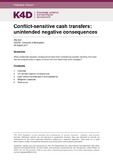Conflict-sensitive cash transfers: unintended negative consequences
Abstract
There are various risks – notably theft, diversion, corruption, security, targeting, misuse by beneficiaries, inflationary effects - associated with cash transfer programmes in fragile contexts. However, the literature indicates that – while different - these are not any greater than those associated with other forms of aid, e.g. vouchers or in-kind goods, and could even be less. Cash transfer programmes have been successfully implemented in a number of fragile contexts, including Afghanistan, Pakistan, Somalia, the Democratic Republic of Congo, Chechnya and Syria. Risks in relation to cash transfer programmes include diversion or theft of funds, corruption in the selection of beneficiaries and in transfer of cash, collusion in corruption by aid agency staff and/or money transfer staff, fraud, and security risks to staff and beneficiaries. There is also the risk that beneficiaries will misuse the cash, wasting it on ‘vice goods’ such as alcohol and drugs. And that cash transfers could have inflationary effects on local markets, pushing up prices of key goods. Overall, the literature finds that the risks associated with cash transfers are no greater than those associated with in-kind assistance, and they can be used effectively in fragile contexts: ‘Cash transfers have been used in fragile and conflict-affected states and to date there is not evidence that this results in large-scale diversion of aid or that cash is more prone to diversion than in-kind aid’ (Gordon, 2015: 3).
Citation
Idris, I. (2017). Conflict-sensitive cash transfers: unintended negative consequences. K4D Helpdesk Report 200. Brighton, UK: Institute of Development Studies.Is part of series
K4D Helpdesk Report;Rights holder
DFIDCollections
- K4D [937]

